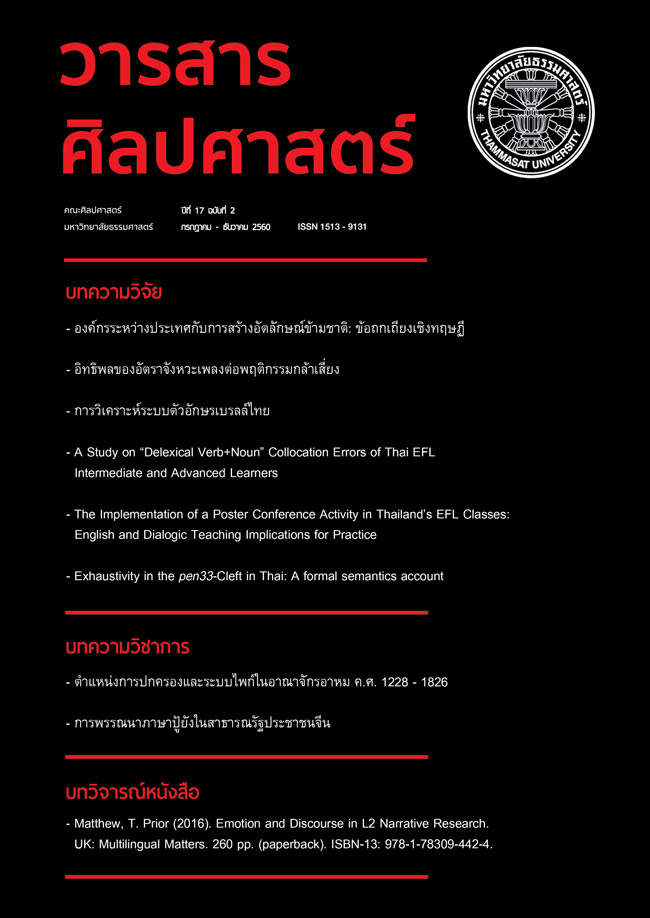การใช้กิจกรรมนำเสนองานแบบโปสเตอร์ในชั้นเรียนภาษาอังกฤษในไทย: ข้อเสนอแนะเรื่องการสอนภาษาอังกฤษและสอนผ่านไดอาล็อก
Main Article Content
บทคัดย่อ
งานวิจัยฉบับนี้มีจุดประสงค์เพื่อศึกษาการใช้กิจกรรมการเสนอผลงานแบบโปสเตอร์เป็นเครื่องมือการจัดการเรียนการสอนในชั้นเรียนภาษาอังกฤษเป็นภาษาต่างประเทศ (EFL) ในมหาวิทยาลัยในประเทศไทย โดยมุ่มเน้นศึกษารูปแบบการใช้กิจกรรมการเสนอผลงานแบบโปสเตอร์และศึกษาความสามารถของกิจกรรมนี้ในการส่งเสริมการเรียนผ่านไดอาล็อกและในการพัฒนาทักษะการพูดภาษาอังกฤษของนักเรียนไทย เก็บข้อมูลเชิงคุณภาพจากการสังเกตชั้นเรียนและการสัมภาษณ์อาจารย์ชาวไทยที่สอนภาษาอังกฤษเป็นภาษาต่างประเทศ จำนวน 4 ท่านและนักศึกษา 12 ท่าน การศึกษาพบว่าการใช้กิจกรรมการเสนอผลงานแบบโปสเตอร์ในมหาวิทยาลัยในประเทศไทยนั้นมักกำหนดเป็นกิจกรรมกลุ่ม กลุ่มมีขนาดใหญ่ถึง 9 - 10 คนต่อกลุ่มและนักศึกษาไทยมักใช้ภาษาไทยในการสื่อสารกันในระหว่างการทำโปสเตอร์และระหว่างการนำเสนอผลงานในการประชุมวิชาการ ผลการวิจัยชี้ให้เห็นกิจกรรมการเสนอผลงานแบบโปสเตอร์สามารถส่งเสริมส่งเสริมการศึกษาผ่านไดอาล็อกเนื่องจากประกอบไปด้วยสถานการณ์ที่หลากหลายที่กำหนดให้นักศึกษาต้องคุยหรือมีปฏิสัมพันธ์ระหว่างสมาชิกในกลุ่มด้วยกันเองและกับอาจารย์ผู้สอน แต่อย่างไรก็ดีผลการวิจัยชี้ให้เห็นว่ากิจกรรมการเสนอผลงานแบบโปสเตอร์ไม่สามารถช่วยพัฒนาทักษะการพูดภาษาอังกฤษของนักศึกษาไทยหากการปฏิสัมพันธ์ การพูดคุย การตั้งคำถามหรือการถกกันอันเกิดระหว่างการจัดทำและนำเสนอโปสเตอร์นั้นยังคงใช้ภาษาไทยเป็นหลัก ผลการวิจัยสะท้อนสิ่งข้อควรปฏิบัติสำหรับอาจารย์ผู้สอนในการออกแบบและนำกิจกรรมการนำเสนอแบบโปสเตอร์ไปใช้เป็นเครื่องมือการสอนในรายวิชาภาษาอังกฤษของตน
Downloads
Article Details

This work is licensed under a Creative Commons Attribution-NonCommercial-NoDerivatives 4.0 International License.
References
Alexander, R. (2008). Culture, Dialogue and Learning: Notes on an Emerging Pedagogy. In Mercer N. & Hodgkinson S. (Eds.). Exploring Talk in School. London, UK: Sage Publications, pp.91-114.
______. (2017). Towards dialogic teaching: Rethinking classroom talk (5th Edition).York: Dialogos.
Chabeli, M.M.(2002). A poster presentation as an evaluation method to facilitate reflective thinking skills in nursing education. Curationis, 25(3), 10-8.
Dawes, L., Mercer, N. & Wegerif, R. (2000). Thinking Together: A programme of activities for developing speaking, listening and thinking skills for children aged 8-11. Birmingham: Imaginative Minds Ltd.
Handron, D.S., (1994). Poster presentations: A tool for evaluating nursing students. Nurse Educator, 19(1), 17-19.
Hess, G.R. & Brooks, E.N. (1998). The class poster conference as a teaching tool. Journal of Natural Resources and Life Science Education, 27, 155-158.
Hess, G.R., Tosney, K. & Leigel, L. (2009). Creating effective poster presentations: AMEE Guide no. 40. Medical Teacher, 31, 1-18.
Koshy, S. (2011). Poster presentation: An effective assessment for large communication classes?' in N. Courtney, C. Holtham & C. Nygaard (Eds), Beyond Transmission: Innovations in University Teaching. Libri publishing: UK. pp. 203
Kremer, J. B. (2016). Giving learners a voice: A study of the dialogic ‘Quality’ of three episodes of teacher-learner talk-in-interaction in a language classroom. In D. Skidmore & K. Murakami (Eds.), Dialogic Pedagogy: The Importance of Dialogue in Teaching and Learning (pp. 135–152). Buffalo; Bristol: Multilingual Matters Ltd.
Rungwaraphong, P. (2012). The promotion of student autonomy in Thailand tertiary education: lecturers’ perspectives and practices. A thesis submitted to the Victoria University of Wellington in fulfilment of the requirements for the degree of Doctor of Philosophy in Education Victoria University of Wellington.
______. (2017a). Framework for dialogic teaching in English reading class: A practice guide for university lecturers. Manuscript submitted for publication.
______. (2017b). Factors Affecting Students’ Participation in Dialogic Talks in Thailand’s EFL Classes: Students’ Perspectives. Manuscript submitted for publication.
Wegerif, R. (2011). From dialectic to dialogic: A response to Wertsch and Kazak. In T. Koschmann (Ed.), Theories of Learning and Studies of Instructional Practice. NJ: Springer.

